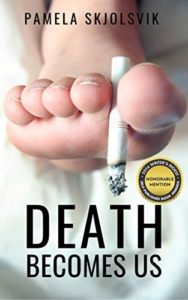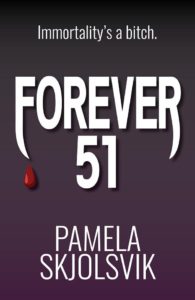An Interview with Pamela Skjolsvik
 What is it about Texas? In the past three months or so, I’ve “met” several authors living in Texas, including Pamela Skjolsvik, whose “last name is pronounced like Dr. Scholls with a ‘vik’ on the end.” Like many authors, Pamela has been published in literary journals and online (including Writer’s Digest), and she’s also placed in writing contests and has been featured on NPR! Much of that writing involves death and prison, and she admits that she’s “weird, socially anxious” and employs “humor to make difficult subjects a bit more palatable.” Many writers and readers identify with her self-description and admire her honesty. They make her real, approachable, and not just a name on the page.
What is it about Texas? In the past three months or so, I’ve “met” several authors living in Texas, including Pamela Skjolsvik, whose “last name is pronounced like Dr. Scholls with a ‘vik’ on the end.” Like many authors, Pamela has been published in literary journals and online (including Writer’s Digest), and she’s also placed in writing contests and has been featured on NPR! Much of that writing involves death and prison, and she admits that she’s “weird, socially anxious” and employs “humor to make difficult subjects a bit more palatable.” Many writers and readers identify with her self-description and admire her honesty. They make her real, approachable, and not just a name on the page.
In 2020, Pamela founded The 2020 Quarantine Book Club on Facebook, which has been a great way for readers and authors to connect with one another. She’s active in that group, constantly promoting good writing and debut authors with no expectation of reciprocity. In my mind, a selfless person like that should be rewarded, so head over to her website or any bookstore (or click on the titles with the text below), and go ahead and buy her books. Pamela has diverse interests that keep her busy, so I’m grateful she took the time to answer a few questions.
Christina: Your memoir, Death Becomes Us, stemmed from an “accidental call to a funeral home” on the same day that David Foster Wallace died. Your mentor suggested you explore “professions that dealt with death.” Prior to that time, did death interest you at all? What do you find so rewarding in writing about it?
Pamela: Like most Americans, I didn’t want to engage with the topic of death unless it was fictionalized, and I was in a darkened movie theater eating popcorn. When I attended grad school for my MFA, I was approaching forty, and I had little experience with death, which is lucky in a way, but due to my anxious nature and catastrophic thinking, it resulted in a lot of anticipatory grief. I didn’t know how I was going to handle the death of my parents. (You can read about the death of my dad in 2018 here and my mom and stepdad in 2020 here.)
After I researched and immersed myself in the lives of people who worked in death professions, I found myself much more comfortable with the topic. In fact, lots of people wanted to talk to me about death, something that initially freaked me out but later I found rather rewarding in that I was able to be present with someone whose emotional state or job used to make me supremely uncomfortable. I realized through the writing of Death Becomes Us that it wasn’t death that scared me, it was grief. I am a fixer, and if someone is grieving, I want to make them feel better or “fix” their grief. What I’ve learned, however, is that there is no way to fix someone’s grief. We all need to be allowed to feel our feelings and take as long as we need to process them. Grief, I’ve discovered, never really goes away, but for me, it has lessened with time.
Christina: Many people don’t find death humorous, but your work infuses the somber with the funny. Do you set out to make your work humorous, and is it humorous on the first draft? Or do you need to add that in during revision?
Pamela: My voice, which tends toward the humorous, is probably my greatest strength as a writer. I don’t ever set out to make something funny, it’s just how my brain is wired. I think humor for me has always been a coping mechanism. When life gets too dark, depressing, or weird, I look for something funny in a situation and it’s usually my own reaction to what’s happening. The joke is usually about me and my social anxiety.
Christina: Forever 51 is a great read, and I think it was a genius move to create a character stuck in menopause. What inspired Veronica and her story?
Pamela: I consider myself a nonfiction writer, but one day my son asked what would happen if a teenage vampire went to a tanning salon so he wouldn’t be so pasty. I didn’t have an answer for my inquisitive son. I had no idea if a tanning bed would burst that teenager into flames, but in the days that followed, I couldn’t stop thinking about an older female vampire doing the same thing in a last-ditch attempt at recapturing her youth. I was forty-five, deep in the trenches of peri-menopause, when I started writing Forever 51. To be honest, it was probably easier to address the taboo topic of aging and menopause via a grumpy vampire than to write about my own experience of increasing invisibility in a culture obsessed with youth.
Christina: Does your day job of book preservationist influence your writing? Did you always want to work with books?
Pamela: It does not influence what I write about, but it does influence my writing. I used to say that I did my best writing when I was washing the dishes. Whenever I’m doing a repetitive task where no one is bothering me (and my kids tend to leave me alone when I’m tackling a stack of dishes) I can mull over character development or plot points AND clean my dishes at the same time. When I’m in my studio making boxes for rare books or repairing dust jackets, I can do the same thing. There is something about engaging my hands in a task that frees up my mind to write. Unfortunately, I don’t have this same success when I move my hands on a keyboard. When I sit down and stare at a blinking curser, I just feel pressure, even if I wriggle my fingers. I used to think I was a pantser, but I’m really a plotter who has mapped it all out in my noggin before I sit down at the computer.
No, I did not always want to work with books. Like most of the jobs I’ve held in my life, it kind of presented itself and I ran with it. Writing doesn’t tend to be the most lucrative profession, so you’ve got to have a day job.
Christina: Your agent is currently shopping Forever 51 as a series. Does that make you nervous? How involved might you be in bringing the book to the screen?
Pamela: No, having my book made into a series does not make me nervous. If anything, that is my dream come true! Back in 2005, I wrote a short script that Fort Lewis College produced, and it was so fun to see the characters I’d created say the words I’d written. While I’d love to be totally involved in the writing of the series, I don’t even know if that’s a possibility because I live in Texas, and I’ve written exactly two scripts in my life. I would like to have some creative control, but we’ll just have to see what happens.
Christina: The 2020 Quarantine Book Club “assists debut authors who’ve had to cancel events during the Coronavirus pandemic of 2020.” If that’s not a fabulous example of literary citizenship, I don’t know what is! What have you learned from this group?
Pamela: I have learned so much from forming this group. The first thing I learned is that during a global pandemic, people want to escape from their own reality and books are an excellent way to do just that. I learned how to do Zoom events. I learned how to ask for help, which is HUGE for me. I also learned how many talented writers are out there and that I really enjoy reading from different genres, which a book club kind of forces you to do. (At least when you are the administrator and are required to read every book!) The QBC is coming up on our one-year anniversary, and we haven’t read one dud in all the books we’ve selected. I’ve also learned how fickle and subjective the publishing world is. Some authors make lists and are featured in major publications and win awards, but that doesn’t necessarily mean their work is any better than another author who is published by a small press. Last but not least, I met a ton of very talented authors this past year and it has been so amazing to witness their debut journey.
Christina: What is your writing kryptonite?
Pamela: I have a few. The first is I find it rather difficult to write at my house. I am too easily distracted by dishes, laundry, my adorable dog Shelton who likes to whine at my feet whenever I’m at the computer too long. I wrote the majority of Forever 51 at—and yes this is so cliché—my local Starbucks. Every day, I gave myself one hour and one latte to get it done. And I did.
Probably my biggest Kryptonite is the internet. I LOVE research probably more than I love to write, so if I Google “Did houses in North Dakota have basements in 1864,” I will go down that rabbit hole for hours. I’m like the mouse in that children’s book If You Give a Mouse a Cookie. That search will lead to several others that have nothing to do with houses or basements, and I will never get anything done. At most, I might talk to a historical architect in Bismarck to confirm or deny my initial query. I’ll also learn some Keto recipes, what Jennifer Aniston and/or Brad Pitt are doing, and the latest sales numbers for my book.
Last, if I don’t have a date to get something done, it will take me forever. I’m an INFP, so I’m the queen of dreaming and procrastination. I need an accountability partner and a do-it-by date.


Thanks to Pamela for agreeing to this interview! If you know of an author who’d like to be featured in an interview (or you are an author who would like to be featured), feel free to leave a comment or email me via my contact page.
